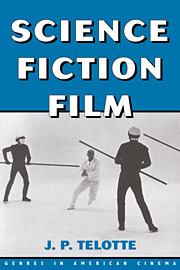Book contents
- Frontmatter
- Contents
- List of Illustrations
- Acknowledgments
- PART I APPROACHES
- 1 Introduction: The World of the Science Fiction Film
- 2 Science Fiction Film: The Critical Context
- PART II HISTORICAL OVERVIEW
- PART III FILM ANALYSES
- Notes
- Bibliography
- Select Filmography of the American Science Fiction Film
- Index
1 - Introduction: The World of the Science Fiction Film
Published online by Cambridge University Press: 03 December 2009
- Frontmatter
- Contents
- List of Illustrations
- Acknowledgments
- PART I APPROACHES
- 1 Introduction: The World of the Science Fiction Film
- 2 Science Fiction Film: The Critical Context
- PART II HISTORICAL OVERVIEW
- PART III FILM ANALYSES
- Notes
- Bibliography
- Select Filmography of the American Science Fiction Film
- Index
Summary
Whenever students of film approach the science fiction genre, it appears they immediately find themselves facing a kind of paradox, one akin to the problematic logic built into the form's combinatory designation – that is, as science and fiction, as fact and fabrication. For a genre that would seem to be almost self-evidently itself tends to slip away, to evade its own evidence or facticity. It is, after all, particularly as its literary practitioners would argue, manifestly about science and scientific possibility – even probability. In fact, it commonly proposes the sort of “what if” game in which scientists are typically engaged as they set about designing experiments and conducting their research: extrapolating from the known in order to explain the unknown. Thus, the writer and legendary pulp editor John W. Campbell Jr. instructed that science fiction should be “an effort to predict the future on the basis of known facts, culled largely from presentday laboratories.” Yet that prescription, which went far to shape the developing literature of science fiction in the United States, hardly accounts for the full appeal of the form – an appeal that some would pass off as due to its adolescent character, others would trace to its archetypal elements, and still others would explain as fundamental to its speculative nature, its expression of common human curiosity. It is an appeal, in any case, that has, over time, lured some of Western culture's most important fictionalists (Edgar Allan Poe, Jack London, H. G. Wells, Aldous Huxley, Walker Percy) to try their hands at its subject matter.
- Type
- Chapter
- Information
- Science Fiction Film , pp. 3 - 32Publisher: Cambridge University PressPrint publication year: 2001

